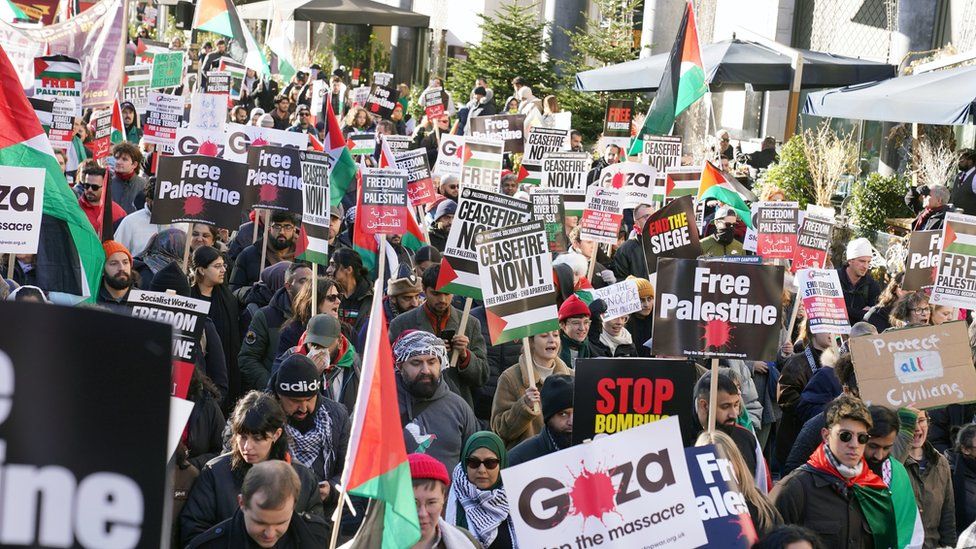
Organisers of the protest estimated that some 300,000 people attended
Tens of thousands of pro-Palestinian demonstrators have marched through central London calling for a permanent ceasefire in the Gaza Strip.
It was the first London march since Armistice Day, when more than 100 counter-protesters were arrested.
Police said 15 people had been arrested at the march, though the “overwhelming majority” protested lawfully.
The protest coincided with a four-day pause in fighting between Israel and Hamas.
The Hamas-run health ministry says more than 14,500 people have been killed in Gaza – and more than a third of them children – since Israel began its retaliatory operation in response to Hamas’s 7 October attacks. Hamas killed 1,200 people and took more than 240 hostages during its unprecedented cross-border incursion.
The Qatar-brokered truce between Israel and Hamas has so far led to the release of 26 Israeli hostages and 39 Palestinians from Israeli prisons.
The march in central London came as a delay to the release of more Israeli hostages was resolved on the second day of the temporary truce.
Organisers of the protest, which marched from Park Lane to Whitehall, estimated that some 300,000 people attended. The Metropolitan Police did not give a number.
The force said the arrests included offences of inciting racial hatred, distributing material likely to stir up racial hatred, supporting a proscribed organisation, refusing directions to disperse, possessing an offensive weapon and assaulting an emergency worker.
The Met has been under pressure for weeks over its handling of the now-regular demonstrations, with pressure from senior politicians for officers to come down harder on alleged displays of antisemitism.
Some 1,500 officers were deployed to the protest and leaflets were given to protesters warning people about words or images that could break the law.
The Met also said it was planning to position Arabic-speaking officers on the march, backed up in its central control room with lawyers to advise on whether specific phrases break the law.
Image source, Reuters
The protest was held on the second day of a four-day pause in fighting between Israel and Hamas
Ben Jamal, director of the Palestine Solidarity Campaign, said the leaflets given out by police at the march “reassert what everybody knows”
Image source, Reuters
Some 1,500 officers were on the streets on Saturday, the Met Police said
Image source, Reuters
Officers were told to protect war memorials following criticism that police had not stopped protesters climbing on them
Image source, PA Media
The protest in central London was the first since Armistice Day
Image source, PA Media
Marches were also been held in Glasgow (pictured) and Cardiff
Protesters carrying Palestinian flags were seen with placards demanding a permanent ceasefire in the conflict, while some referenced the slogan “from the river to the sea”.
The language is interpreted by Israel and most Jewish groups as an expression of a desire to see Israel erased from the world, though pro-Palestinian activists contest this, saying it refers to “the right of all Palestinians to freedom, equality and justice”.
So far, the temporary truce is still holding and follows weeks of fighting and Israeli bombardments of Gaza, with the conflict sparked by Hamas’s unprecedented cross-border attack in southern Israel that saw 1,200 people killed.
Speaking at London’s march, a pro-Palestinian protester played down the long-term significance of the temporary ceasefire.
Shaun, 33, from north London, said: “I don’t know what’s going to come from it, I don’t know if it’s positive, but I know full well that once this truce and temporary ceasefire are done they (Israel) are going to continue bombing and we’re going to be right back where we were, so I’m not holding my breath.”
Marches were also held in Glasgow and Cardiff.
Asked about the Met’s leaflets, march organiser Ben Jamal, director of the Palestine Solidarity Campaign, said police had been placed under “considerable pressure” by politicians to be more aggressive in their policing of the demonstration.
“The leaflets reassert what everybody knows, which is that there are laws against hate speech, there are laws for showing support for proscribed hate organisations – so I’m not sure what the leaflets add,” he said.
Separately, a different protest was held by the Islamist group Hizb-ut-Tahrir outside the Egyptian embassy. The Met said two people at that march were arrested for racially-aggravated public order offences.
It was the first by the group since 21 October, when video emerged showing a man chanting “jihad”, prompting an outcry from politicians. The Met found no offences were identified from the clip.

